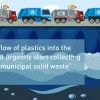Earlier this week I had the privilege of speaking at the German Mission during the United Nations’ “The Oceans Conference.” The conference was designed to advance implementation of Sustainable Development Goal 14 to conserve and sustainably use our oceans, seas, and marine resources. And this obviously includes our shared goal of keeping plastics out of […]
Policy
How can we fix our nation’s infrastructure problems? Put competition to work
Virtually every day in the U.S., we are flooded with more and more reports about growing problems with the nation’s crumbling water infrastructure. While the problem was first brought to the public’s awareness in Flint, water systems are failing in countless other cities, from Cleveland, to New Jersey, to Massachusetts. Now, we are seeing more […]
Proposed marine debris legislation helps fortify industry’s ongoing work
On March 29 Senators Sullivan (R-AK), Whitehouse (D-RI) and Booker (D-NJ) introduced the bipartisan Saving Our Seas Act, which also included Senators Coons (D-DE), Inhofe (R-OK), Murkowski (R-AK), Peters (D-MI) and Tillis (R-NC) as cosponsors. In addition to reauthorizing National Oceanic and Atmospheric Administration’s (NOAA) Marine Debris research program, the bill underscores the need for […]
Working together to improve EPA’s proposed rules for chemical prioritization and risk evaluation under the Lautenberg Act
As efforts continue in earnest to implement the Frank R. Lautenberg Chemical Safety for the 21st Century Act (LCSA), ACC sees two areas in particular where industry and the Environmental Protection Agency (EPA) can work together closely to put the program on a solid footing – prioritizing chemicals for review and conducting efficient risk evaluations. […]
Federal agencies should update their science — and industry scientists are ready to help
Scientists from the public and private sector as well as academia could all have something to rally behind under the current Administration and Congress: a stronger appreciation for using good science to help drive regulatory decision-making. Congress has already begun to take action. This morning, Dr. Nancy Beck, Ph.D., provided testimony to a Senate Subcommittee about […]

Connecticut launches statewide campaign to increase plastic film recycling
On Tuesday, the Wrap Recycling Action Program (WRAP), in partnership with the Connecticut Department of Energy & Environment Protection (DEEP) kicked off a statewide awareness campaign to increase the recycling of plastic wraps, bags and film packaging (collectively known as plastic film). A recent statewide survey showed why this CT WRAP campaign is so important: […]

2017 GlobalChem will showcase new day in politics, chemical regulation and international cooperation
We all knew that modernizing the Toxic Substances Control Act (TSCA) through passage and implementation of the Lautenberg Chemical Safety Act (LCSA) would create a new era of chemical regulation in the United States. What we may not have known was that the statutory change would coincide with major changes in our political landscape. The […]

Are there really thousands of untested chemicals in everyday products?
If you’ve ever read a news article or blog post about chemicals, you may have come across the oft-cited claim that there are 84,000 untested chemicals in the products we use every day. Taken at face value, this figure is startling. But, if you check the facts and take a closer look, you’ll also find […]
Key principles for applying benefit-cost analysis to federal regulation
Since 1974, Presidents have issued Executive Orders requiring regulatory agencies to analyze the anticipated results and economic effects of proposed regulations. Executive Order 13563, Executive Order 12866, and the Office of Management and Budget (OMB) Circular A-4 require agencies to conduct a careful and transparent analysis of the anticipated impacts of economically significant regulatory actions. […]
Japan must have listened to the science on BPA
More than 10 years ago, bisphenol A (BPA) was a hot topic in Japan. But these days, not so much. The Japanese government ministries with responsibility for human health continue to monitor scientific developments on BPA in the rest of the world, but without any apparent pressure or need for regulatory action. Likewise, there’s little […]
- On the road with #ACCaugust - 2015
- Chemicals in food: Top chemical food myths debunked…naturally! [video]
- Nanotechnology could be the next big thing in medical care
- Fueling Export Growth (Part 2 of 2): Why the expected surge in U.S. chemicals exports will depend on our country’s ability to deliver on its ambitious trade agenda
- Fueling Export Growth (Part 1 of 2): U.S. chemical exports linked to natural gas could double by 2030; plastics products leading the surge
- Product stewardship helps keep workers ‘Safe + Sound’ June 14, 2017
-
 Marine litter: Let’s stay focused on solutions
June 13, 2017
Marine litter: Let’s stay focused on solutions
June 13, 2017
-
 Neocon: Spotlight on high performing materials in interior design
June 12, 2017
Neocon: Spotlight on high performing materials in interior design
June 12, 2017





